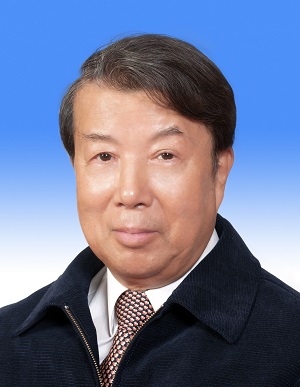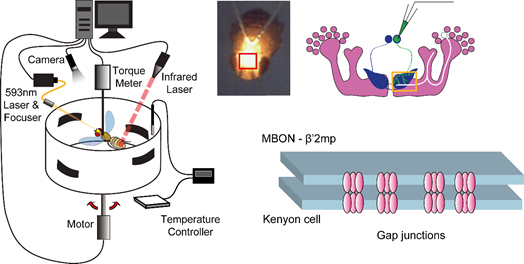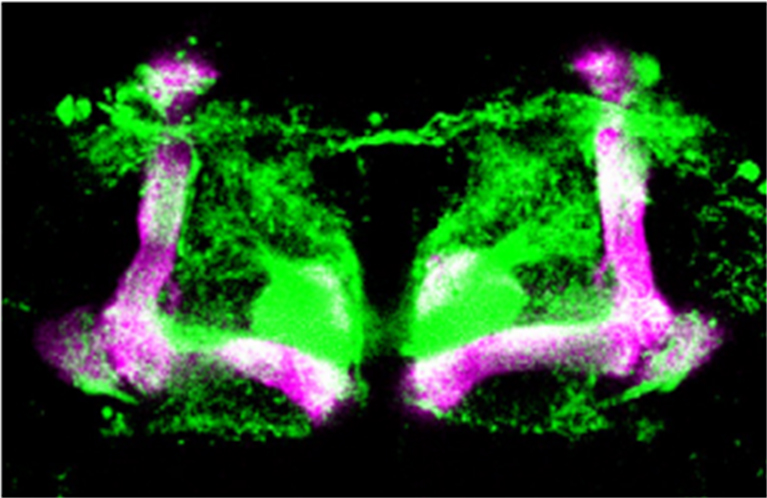
Aike Guo, Ph.D, Prof., CASM
-
Principal Investigator
State Key Laboratory of Cognitive Science and Mental Health, IBP
Research Interests: Learning /Memory of Drosophila
Email: akguo@ion.ac.cn
Tel: 010-64888532
Address: 15 Datun Road, Chaoyang District, Beijing, 100101, China
Chinese personal homepage
- Biography
1960 - 1965 Dept. of Biophysics, Moscow University, (USSR)
1977 - 1979 Dr. rer. nat. Munich University, Germany
1982 - 1984 Visiting Scientist (Max-Planck Institute for Biological Cybernetics, Germany)
1988 - Research Professor, Institute of Biophysics, CAS
2003 - Academician of the Chinese Academy of Sciences
2006 was awarded The Science and Technology Advancement Award of the Ho Leung Ho Lee Foundation
2006.3 was elected the Advanced Scientist of CAS
2008 was awarded the 2008 Distinguished Scientist Award of Asia pacific Neural Network Assembly
2000 - 2005 The principal researcher of State 973 projects (Major State Basic Research Program Grant) “Brain Development and Plasticity”
2006 - 2008 The principal researcher of State 973 projects “Brain Plasticity in Structure and Function”
2012 - Principal Scientist for the Strategic Priority Research Program (B) of the Chinese Academy of Sciences: Mapping Functional Brain Connections Project
- Awards
- Membership in Academies & Societies
- Research Interests
He has established the first Laboratory of Learning /Memory of Drosophila in China at IBP in1993. He has been engaged in the study about the learning, memory, selective attention, decision making, circadian clock, sleep and memory relationship, male-male courtship, as well as the neurode generations in flies.
His current and future research interests are focusing on goal-directed behaviors or value-guided behavior to identify core neural circuits of how the brain selects the right behavior from the cost and benefit expectations for the behavioral options.
His Lab discovered a simple value based decision-making behavior in Drosophila facing competing visual cues at flight simulator and found that Dopamine-Mushroom body circuit regulate decision-making process in Drosophila (Science, 2001; Science, 2007). His Lab also found that previous experience can enhance visual feature extraction among combinatorial features and that MBs are required for this experience-dependent visual cognition (J. Neurosci, 2007) and that increased dopamine level enhances male-male courtship in Drosophila (J. Neurosci, 2008). They found that a GABAergic inhibitory neural circuit regulates both visual and olfactory reversal learning in Drosophila (J. Neurosci, 2012; Learning and Memory, 2012). Recently, his Lab discovered that two clusters of GABAergic Ellipsoid Body neurons modulate olfactory labile memory (J. Neurosci, 2013). And their results revealed parallel pathways for cross-modal memory retrieval in Drosophila (J. Neurosci, 2013). They discovered that “Transformation of odor selectivity from projection neuron inputs to single mushroom body neurons mapped with dual-color calcium imaging” ( Proc Natl Acad Sci U S A, 2013). Very recently, they found that Gap Junction networks in mushroom bodies participate in visual learning and memory in Drosophila (eLife, 2016)

Fig 1. Setup of the optogenetic flight simulator system verified gap junction network present in mushroom bodies in Drosophila.

Fig 2. Fly brain image shows both the dopamine system (green) and the mushroom body (magenta). The Dopamine–mushroom body circuit involved in making value-based decisions.
- Grants
- Selected Publications
1. Tang Shiming, Guo Aike (2001) Choice behavior of Drosophila facing contradictory visual cues, Science, 294, 1543-1547.
2. Guo Jianzeng and Guo Aike (2005) Crossmodal interaction between olfactory and visual learning in Drosophila, Science, 309:307-310.
3. Zhang K. Guo J. Z., Peng Y.Q., Xi W., Guo A. K. (2007) Dopamine-Mushroom Body Circuit Regulates Saliency-Based Decision-Making in Drosophila. Science, 316(5833):1901-1904.
4. Peng Yueqing, Xi Wang, Zhang Wei, Zhang Ke and Guo A. K. (2007) Experience Improves Feature Extraction in Drosophila. The Journal of Neuroscience, 27(19):5139-5145.
5. Liu Tong, Dartevelle Laurence, Yuan Chunyan, Wei Hongping, Wang Ying, Jean-Francois Ferveur and Guo A. K. (2008) Increased dopamine level enhances male-male courtship in Drosophila. The Journal of Neuroscience, 28 (21):5539-5546.
6. Qingzhong Ren, Hao Li, Yanying Wu, Jing Ren, and Aike Guo. A GABAergic inhibitory neural circuit regulates visual reversal learning in Drosophila. (2012) The Journal of Neuroscience. 32:11524-11538. ( Highlighted in the This Week in J. Neurosci.)
7. Zhiping Zhang, Xiaoting Li, Jing Guo, Yan Li, and Aike Guo (2013) Two Clusters of GABAergic Ellipsoid Body Neurons Modulate Olfactory Labile Memory in Drosophila. The Journal of Neuroscience ,33(12), 5175-5181
8. Xiaonan Zhang, Qingzhong Ren, and Aike Guo (2013)Parallel Pathways for Cross-modal Memory Retrieval in Drosophila. The Journal of Neuroscience, 33(20), 8784-8793.
9. Yanying Wu, Qingzhong Ren, Hao Li, Aike Guo (2012) The GABAergic anterior paired lateral neurons facilitate olfactory reversal learning in Drosophila, Learning and Memory, Learn. Mem. 2012, 19: 478-486.
10. Xiaonan Zhang, He Liu, Zhengchang Lei, Zhihua Wu, and Aike Guo (2013) Lobula-specific visual projection neurons are involved in perception of motion defined second-order motion in Drosophila,The Journal of Experimental Biology 216, 524-534
11. Li H, Li Y, Lei Z, Wang K, Guo A. (2013) Transformation of odor selectivity from projection neurons to single mushroom body neurons mapped with dual-color calcium imaging. Proc Natl Acad Sci U S A. 110(29):12084-12089.
12. Yi W, Zhang Y,Tian Y, Guo J,Li Y,Guo A. (2013) A subset of cholinergic mushroom body neurons requires Go signaling to regulate sleep in Drosophila. SLEEP 36(12):1809-1821.
13. Qingqing Liu, Xing Yang, Jingsong Tian, Zongbao Gao, Meng Wang, Yan Li, Aike Guo (2016) Gap Junction networks in mushroom bodies participate in visual learning and memory in Drosophila. eLife. 5:e13238. DOI:10.7554/eLife.13238
14. Yunpeng Zhang, Jing Guo, Aike Guo and Yan Li (2016) Nicotine-induced acute hyperactivity is mediated by dopaminergic system in a sexually dimorphic manner. Neuroscience 332:149-159
(From Aike Guo, April 27, 2018)

